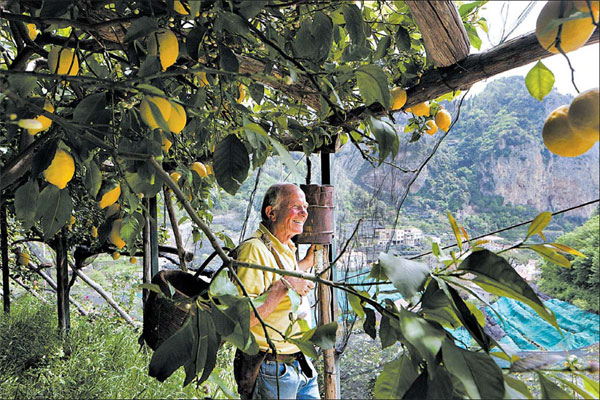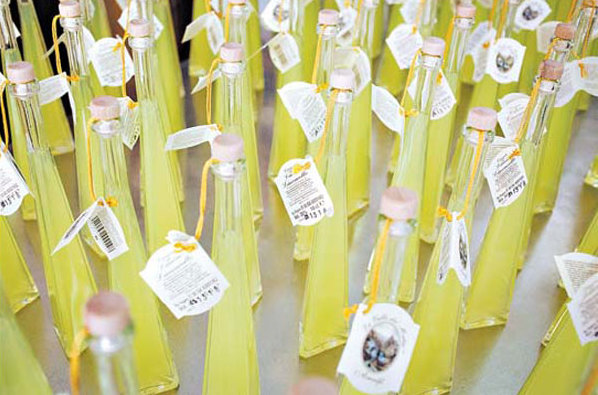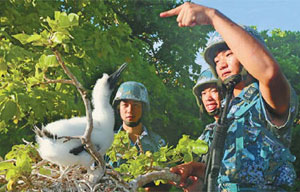In the cradle of a sweet life
Updated: 2013-05-27 09:20
By Rachel Donadio (The New York Times)
|
||||||||
 |
|
On the Amalfi Coast, Luigi Aceto and his family farm lemons that are sweet enough to eat whole. The family's limoncello, below. [Photographs/The New York Times] |
 |
|
Italian family tends lemon groves on terraced hillsides. [Photographs/The New York Times] |
Amalfi, Italy
On a recent spring morning, Luigi Aceto, a hale 78, climbed a ladder in a terraced lemon grove that stretched up the hillside in one of Italy's most picturesque towns and expertly began snipping lemons into a basket. The sun was shining. The lemons were ripe and as big as fists. The scent of blossoms was intoxicating.
Mr. Aceto was born and raised in these lemon groves, where his family has been working for centuries, first as tenant farmers, then as landowners.
"I have the honor and the burden of bearing witness here to six generations," he said. He was referring to the three generations that preceded him as well as his own, and those of his two sons and grandchildren.
In many ways, the Aceto family tree mirrors Italy's transformation from an agrarian peasant society before World War II into an industrial power afterward - and its lingering ambivalence about whether it wants to compete globally or believes its future lies in local traditions. The debate has become more intense since the introduction of the euro in 2002, which raised the price of Italian exports, making it harder for small businesses to compete.
The Acetos make a niche product - world-famous lemons, prized for their low acidity and delicate flavor - and like many small Italian businesses, they are reluctant to grow.
"My two sons work for the business and are dedicated; I count on them," he said.

Mr. Aceto's son Marco runs the production side of the company, La Valle dei Mulini, making limoncello liquor, lemon honey and other products from the lemons, which are so sweet you can eat them whole. Marco's wife sells the products in the town's main square. Mr. Aceto's other son, Salvatore, recently left a job as an accountant to work for the family business.
That isn't always the case for other nearby families, whose children left the lemon groves to go to college and seek professional jobs in the cities.
"One of our main goals is to prevent the abandonment of the gardens on the coast," said Salvatore De Riso, a pastry chef and the president of the Consortium for the Protection of the Amalfi Lemon.
But Mr. Aceto said the consortium is pushing small growers like him to produce too much.
All lemons certified from Amalfi must be of the "sfusato" family, which comes from the Italian word for spindle, because of their pointed ends. These grow only in the microclimate of the Amalfi Coast, where cooling breezes are trapped between steep mountain valleys.
Luigi Aceto remembers being a child during the war, when the family nearly starved and he and his siblings were sent to gather herbs and anything else edible. "We had relatives in America who sent us packages," he recalled.
The Aceto lemon groves could be sold for millions of euros for luxury vacation properties, but the family isn't interested.
"I'm taking care of the patrimony of humanity," Mr. Aceto said. Planted in a series of stonewalled terraces, the roots of the trees help prevent soil erosion and landslides. "The rays of the sun penetrate under the roots, so that the lemon is like a little baby in its cradle," he said.
Mr. Aceto added: "Maybe lemon juice runs in my veins instead of blood."
Gaia Pianigiani contributed reporting.
The New York Times

 'Taken 2' grabs movie box office crown
'Taken 2' grabs movie box office crown
 Rihanna's 'Diamonds' tops UK pop chart
Rihanna's 'Diamonds' tops UK pop chart
 Fans get look at vintage Rolling Stones
Fans get look at vintage Rolling Stones
 Celebrities attend Power of Women event
Celebrities attend Power of Women event
 Ang Lee breaks 'every rule' to make unlikely new Life of Pi film
Ang Lee breaks 'every rule' to make unlikely new Life of Pi film
 Rihanna almost thrown out of nightclub
Rihanna almost thrown out of nightclub
 'Dark Knight' wins weekend box office
'Dark Knight' wins weekend box office
 'Total Recall' stars gather in Beverly Hills
'Total Recall' stars gather in Beverly Hills
Most Viewed
Editor's Picks

|

|

|

|

|

|
Today's Top News
Shenzhou X astronaut gives lecture today
US told to reassess duties on Chinese paper
Chinese seek greater share of satellite market
Russia rejects Obama's nuke cut proposal
US immigration bill sees Senate breakthrough
Brazilian cities revoke fare hikes
Moody's warns on China's local govt debt
Air quality in major cities drops in May
US Weekly

|

|









